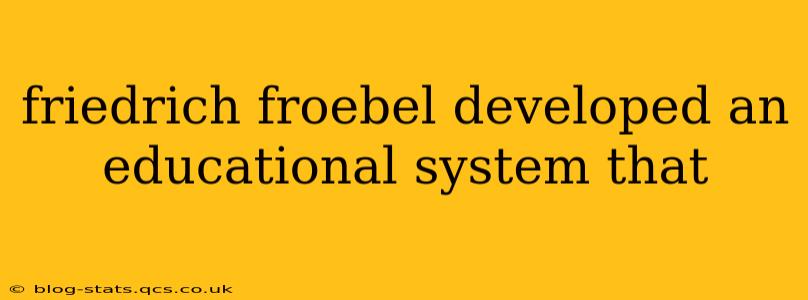Friedrich Fröbel (1782-1852), a German pedagogue, profoundly impacted early childhood education with his innovative approach. He's widely considered the father of kindergarten, a term he coined, developing a system centered on play-based learning and the holistic development of the child. His philosophy wasn't merely about academics; it was about nurturing the child's physical, emotional, intellectual, and spiritual growth. This article delves into the core principles of Fröbel's educational system, exploring its lasting influence on modern early childhood education.
What are the main principles of Fröbel's educational system?
Fröbel's system, at its heart, believed in the inherent goodness and potential of every child. He saw education as a process of unfolding this innate potential, fostering a love of learning and a sense of self-discovery. Key principles included:
-
Play-based learning: Fröbel firmly believed that play is crucial for a child's development. His kindergarten incorporated various activities, like games, songs, and crafts, designed to stimulate creativity, problem-solving skills, and social interaction. These weren't just idle amusements; they were carefully structured to promote learning.
-
Holistic development: His approach encompassed the whole child – cognitive, emotional, physical, and spiritual – acknowledging the interconnectedness of these aspects. He didn't focus solely on intellectual development, but on nurturing the entire being.
-
Self-activity: Fröbel emphasized the importance of children actively participating in their learning. His methods encouraged self-expression, exploration, and discovery, rather than rote learning or passive absorption of information.
-
Gifts and Occupations: These were structured materials designed to engage children in specific learning activities. Gifts were typically sets of geometric solids, while occupations involved activities like weaving, drawing, and modeling with clay. These fostered fine motor skills, spatial reasoning, and creative expression.
What were Fröbel's "gifts"?
Fröbel's "Gifts" were a series of structured play materials designed to engage children's senses and stimulate their understanding of the world. They were carefully crafted sets, progressing in complexity, introducing concepts like shape, color, and spatial relationships. These gifts helped children develop their fine motor skills, problem-solving abilities, and mathematical understanding through playful exploration.
What were Fröbel's "occupations"?
Fröbel's "Occupations" complemented the Gifts, offering more open-ended activities that allowed children to apply the concepts learned through the Gifts. These included activities such as:
- Paper folding: Developing fine motor skills and spatial reasoning.
- Modeling with clay: Encouraging creativity and tactile exploration.
- Weaving: Promoting hand-eye coordination and pattern recognition.
- Drawing and painting: Fostering self-expression and artistic abilities.
How did Fröbel's ideas influence modern education?
Fröbel's influence on modern education is undeniable. His emphasis on play-based learning, holistic development, and child-centered approaches has shaped early childhood education worldwide. Many contemporary educational philosophies and practices owe a debt to his pioneering work. Kindergarten programs globally incorporate elements of his methodology, reflecting the enduring relevance of his insights.
What is the legacy of Friedrich Fröbel?
Friedrich Fröbel's legacy extends far beyond the establishment of kindergarten. His emphasis on play, the importance of self-activity in learning, and the holistic development of the child continue to inform educational practices today. His contributions represent a paradigm shift in how we approach early childhood education, highlighting the importance of nurturing the whole child and fostering a love of learning from an early age. His work serves as a reminder that education is not merely about the acquisition of knowledge, but about the cultivation of the individual's potential and the fostering of a lifelong love of learning.
